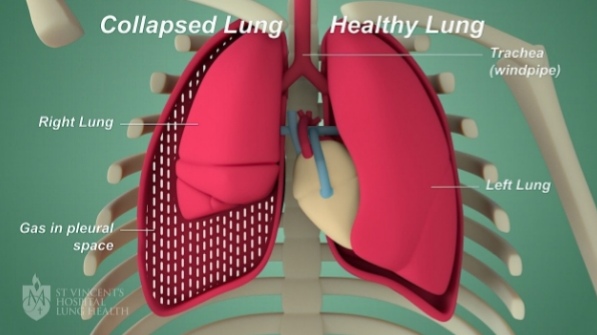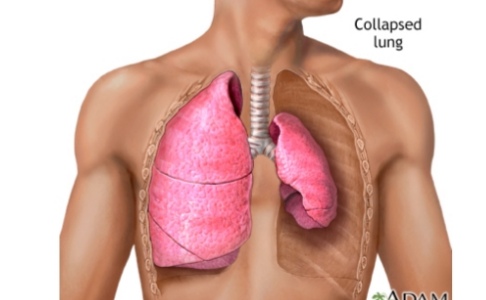All You Ned to Known About Collapsed Lung.
2 min read
A collapsed lung, also known as pneumothorax, can occur due to various reasons. Here are some common causes:

1. Trauma: Injury to the chest, such as a car accident or fall, can cause a collapsed lung.
2. Blebs or bullae: Weak spots in the lung tissue can rupture, leading to air leakage.
3. Chronic obstructive pulmonary disease (COPD): Conditions like emphysema or chronic bronchitis can increase the risk.
4. Pneumonia: Severe pneumonia can cause inflammation and air leakage.
5. Asthma: Severe asthma attacks can lead to airway constriction and lung collapse.
6. Tuberculosis: This bacterial infection can cause lung damage and air leakage.
7. Pulmonary embolism: A blood clot in the lungs can block blood flow and lead to lung collapse.
8. Lung cancer: Tumors can weaken lung tissue and cause air leakage.
9. Pneumothorax after surgery: Surgical procedures, especially those involving the chest, can increase the risk.

10. Genetic conditions: Certain conditions, like cystic fibrosis or Marfan syndrome, can affect lung tissue and increase the risk.
11. Smoking: Smoking can damage lung tissue and increase the risk of collapsed lung.
12. Inhaling drugs: Inhalation of drugs like cocaine can cause lung damage and air leakage.
13. Lung overexpansion injury: Sudden changes in air pressure can cause lung damage.
It’s important to seek medical attention immediately if you experience symptoms of a collapsed lung.
Would you like more information on any specific cause or prevention strategies?
Symptoms of a collapsed lung (pneumothorax) may include:
1. Sudden chest pain: Sharp, stabbing pain that worsens with deep breathing or coughing.
2. Shortness of breath: Difficulty breathing or feeling winded even when sitting still.
3. Coughing: May be dry or produce blood-tinged mucus.
4. Fatigue: Feeling weak or tired.
5. Bluish discoloration: Skin may take on a bluish hue due to inadequate oxygen.
6. Rapid heart rate: Heart beats faster to compensate for reduced lung function.
7. Anxiety or panic: Feeling restless or panicked due to breathing difficulties.
8. Chest tightness: Feeling like the chest is constricted or squeezed.
9. Low blood pressure: May lead to dizziness or fainting.
10. Confusion or altered mental state: In severe cases, reduced oxygen levels may affect brain function.
Symptoms can vary depending on the severity of the collapse and individual factors.
If you experience any of these symptoms, seek medical attention immediately.
Would you like more information on diagnosis or treatment options?
Note: The information here was obtained from the internet.





